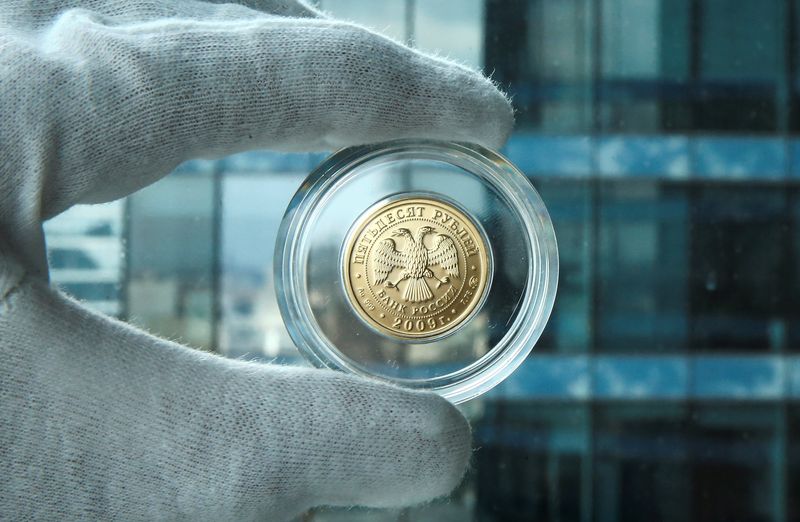MOSCOW (Reuters) - A move by Britain, the United States, Japan and Canada to ban new imports of Russian gold is being seen as largely symbolic within the global gold market as Russian exports to the West have already dried up.
Britain said on Sunday the ban was intended to limit Russia's ability to fund its military operation in Ukraine.
It was not clear whether there was a consensus within the Group of Seven wealthy democracies on the plan, with European Council President Charles Michel and German Chancellor Olaf Scholz saying it needed to be discussed further.
Gold prices were up 0.5% at around $1,835 an ounce on Monday.
HOW MUCH GOLD DOES RUSSIA PRODUCE?
Russia is one of the world's largest producers of gold, along with China and Australia.
Last year, it mined 314 tonnes of gold, according to the Russian finance ministry, accounting for nearly 10% of the metal dug up globally. That gold is worth around $19 billion at current prices.
Polyus is the country's largest gold producer, followed by Polymetal.
WHERE DID RUSSIAN GOLD EXPORTS GO BEFORE THE CONFLICT?
Russian gold miners mainly sold their gold to Russian commercial banks, which typically either sold to the Russian central bank or exported it.
In recent years, the vast majority of Russia's gold was sent to Britain, the world's biggest bullion trade and storage centre.
Britain imported $15.2 billion worth of Russian gold last year, UK customs data show. From there, it can be re-exported to other markets.
Russia also sent some gold in recent years to countries including Switzerland, Turkey and Kazakhstan, according to Russian customs data.
WHAT HAPPENED AFTER RUSSIA SENT TROOPS INTO UKRAINE?
Since Feb. 24, Russian gold exports to the West have largely stopped.
Western governments sanctioned Russia's main gold-trading banks, including VTB, Otkritie, and Sberbank, and many international banks, refiners and shippers stopped dealing with Russian bullion.
On March 7, the London Bullion Market Association (LBMA) suspended its accreditation of Russian precious metals refiners, barring them from selling new production in London.
Britain imported 29 tonnes of gold worth $1.7 billion from Russia in February, UK customs data on the U.N. Comtrade database show. In March, the last month for which data was available, Britain imported just 26 kilograms from Russia.
WHERE DOES RUSSIAN GOLD GO NOW?
Russia's customs service and central bank have suspended publication of import and export data and information about state gold holdings.
Buyers for Russia's gold now include the country's central bank, people inside Russia who want a safe investment and buyers in Asia, where most countries have not sanctioned Russia, Russian miners, bankers and analysts say.

"[Russia's] gold exports have already been rerouted since the start of the war, flowing eastwards rather than westwards, reflecting self-sanctioning from Western world gold market participants," said Julius Baer analyst Carsten Menke.
"The implications of a ban on the gold market are likely very limited," he said.